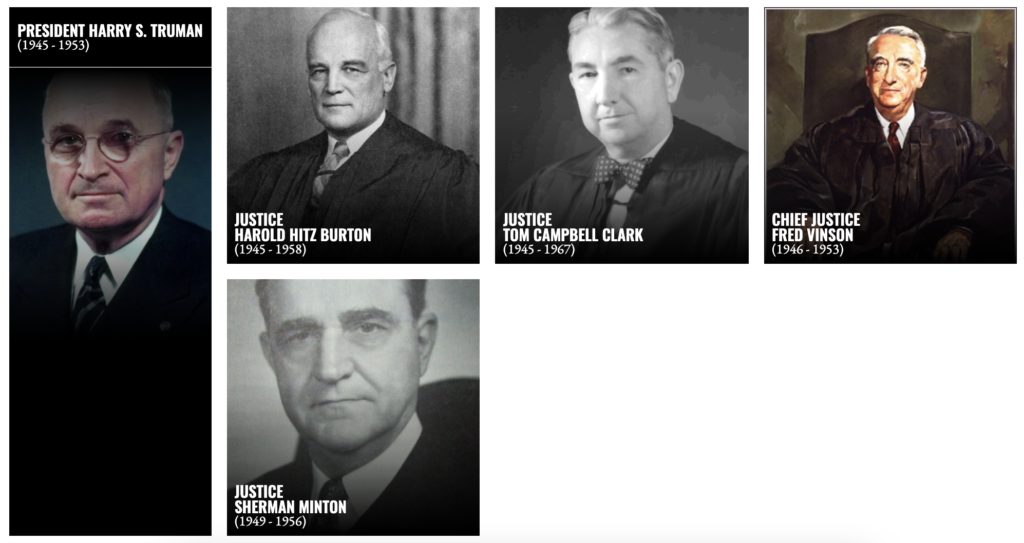The Volokh Conspiracy
Mostly law professors | Sometimes contrarian | Often libertarian | Always independent
Today in Supreme Court History: April 12, 1945
4/12/1945: President Harry Truman's inauguration. He would make four appointments to the Supreme Court: Chief Justice Vinson, and Justices Burton, Clark, and Minton.

Editor's Note: We invite comments and request that they be civil and on-topic. We do not moderate or assume any responsibility for comments, which are owned by the readers who post them. Comments do not represent the views of Reason.com or Reason Foundation. We reserve the right to delete any comment for any reason at any time. Comments may only be edited within 5 minutes of posting. Report abuses.
Please to post comments


NLRB v. Jones & Laughlin Steel Corp., 301 U.S. 1 (decided April 12, 1937): in an early demonstration of the “switch” of 1937, upholding Constitutionality of National Labor Relations Act (and actions of NLRB) (forcing major steel producer to bargain with union)
Texas v. White, 74 U.S. 700 (decided April 12, 1869): holding, mostly, that Texas is a state over which the Supreme Court has jurisdiction, and secondarily, that it had jurisdiction over suit against Texas for recovery of bonds issued pre-Civil War (limited to its facts in Morgan v. U.S., 1885)
Gerende v. Board of Supervisors of Elections of Baltimore City, 341 U.S. 56 (decided April 12, 1951): upholding state statute requiring candidates for public office to declare they are not subversives
Evansville & Bowling Green Packet Co. v. Chero Cola Bottling Co., 271 U.S. 19 (decided April 12, 1926): wharfboat (always tied to wharf, used as office, warehouse, etc., connected to city’s water, electric and telephone systems, never transports cargo — ever see the movie “Pickup on South Street”?) was not “vessel” within meaning of traditional rule limiting owner’s liability to value of ship plus cargo; therefore no admiralty jurisdiction for limitation of liability where plaintiff’s merchandise lost when wharfboat sank
Liberato v. Royer, 270 U.S. 535 (decided April 12, 1926): Italian parents could not recover compensation due deceased son upon whom they were dependent because Pennsylvania no-fault scheme expressly disqualified foreign parents from recovery; treaty with Italy extended only to right to bring suits alleging fault (that was one hard-hearted employer)
People v. Wilson, 318 U.S. 688 (decided April 12, 1943): habeas remanded to state trial court because state’s highest court had changed the law in the meantime (issue was whether conviction could be vacated where guilty plea had been obtained fraudulently, Lyons v. Goldstein, 290 N.Y. 19)
Associated Press v. NLRB, 301 U.S. 103 (decided April 12, 1937): another early “switch” case, this one holding that news gathering organization was involved in “interstate commerce” and subject to NLRB jurisdiction
Texas & Pacific Ry. Co. v. Marcus, 213 U.S. 288 (decided April 12, 1909): plaintiff’s case (fell when train jerked while she was crossing between trains via their vestibules; allegation was train should have given her notice that it was about to move) should not have gone to jury
Greenleaf-Johnson Lumber Co. v. Garrison, 237 U.S. 251 (decided April 12, 1915): no “taking” when Congress established new harbor line for expanded Navy yard which destroyed wharves of private owners
Massachusetts v. New York, 271 U.S. 65 (decided April 12, 1926): Massachusetts, incredibly, claimed land in western New York, citing a pre-Revolutionary War grant (you know, like the one that gave Connecticut part of what is now California, https://mieummedia.com/2019/04/10/that-time-connecticuts-borders-extended-to-the-pacific-ocean-explained/); it supposedly had sold it in 1786 to Nathaniel Gorham, at the time the “president” of the Articles of Confederation Congress, who the next year chaired the formative Committee of the Whole weeks of the Constitutional Convention)
Great stuff as always, CC. Appreciate you putting these together.
Thanks for the compliment!
Texas v. White –
Includes two key points
1) This is an indestructible Union. Cite: North v. South, 1861-1865.
2) The Union is made up of indestructible states. In short, Thad Stevens’ “state suicide” theory is wrong and the Confederate states continued their existence as states despite their governments and people being in rebellion. When the states were reconquered for the Union, the feds had to give them new governments under the clause guaranteeing each state a republican (small r) form of government.
Evansville & Bowling Green Packet Co. v. Chero Cola Bottling Co.,
"Pickup on South Street" is a great movie which everyone should see. Thelma Ritter is at her best as Moe, a police informant who teaches everyone about pickpockets. And, of course, you learn about wharfboats.
Thelma Ritter was one of the great character actors.
The best scene in the movie is when Richard Widmark, a low-life pickpocket, goes to the New York Public Library microfilm room (I've been there) with this strange film that people seem to really really want, and the look on his face when he sees the codes -- "I don't know what this is, but this is damned important!"
Though the Communist agent (Richard Kiley) is so strange that you wonder what the Jean Peters character ever saw in him.